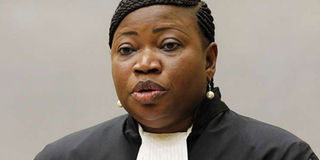ICC isn’t in the hands of UPDF, says chief prosecutor Bensouda

International Criminal Court chief prosecutor Fatou Bensouda. AFP PHOTO
What you need to know:
Currently under the detention facility at the ICC, Ongwen is accused, pursuant to articles 25(3) (a) (direct perpetration, indirect perpetration and indirect co-perpetration), 25(3) (b) (ordering), 25 (3) (d) (i) and (ii) and 28 (a) (command responsibility) of the Rome Statute, for war crimes and crimes against humanity.
The Hague-based International Criminal Court (ICC) has dismissed as “bogus” claims that it sided with the Ugandan government to “wrongly” prosecute Dominic Ongwen.
“I reject that accusation. I reject what they are saying that we are in the hands of the Uganda People’s Defence Forces (UPDF),” Ms Fatou Bensouda told Ugandan delegation at the ICC headquarters on October 5, 2018.
The Chief Prosecutor added: “I don’t understand how anyone can come to that conclusion and I re-emphasise that we are working based on the evidence collected. We are going before the judges; we are presenting the cases based on those who bear the responsibility for the crimes. We are not in the hands of anybody.”
On Thursday last week, Ongwen’s lawyers led by lawyer Krispus Ayena Odongo accused the Office of the Prosecutor (OTP) of being misused by Uganda to pin their client.
The team argued that Uganda being State Party to the Rome Statute referred only one side of the conflict to ICC.
Mr Ayena said the Chief Prosecutor of The Hague-based court should have gone with an open mind “not with a close mind to investigate only one specific group of people, and should have investigated everywhere.”
“As you will all agree with me, it takes two to tangle – LRA fought with UPDF (Uganda People’s Defence Forces) you know that. Why did they refer only one side of the coin to the court? So that is culprit number one,” Mr Ayena said, further adding that the government of Uganda is misusing the ICC.
According to the lawyer, there is sizeable evidence that UPDF committed atrocities in the north.
“All these are common knowledge because the video clip (recently played at the ICC) exposed the bitterness with which Gen David Tinyefuza aka Gen David Sejusa accused his commander-in-chief of being a megalomania, of not for anything else but power, of failing to stop the war and also accused him of dehumanising the people of Acholi and the people of northern Uganda for 27 years,” the lawyer said.
However, Ms Bensouda fired back at the critics, saying that any country or anybody can say whatever they want regarding the work of the ICC “but this is not going to deter us from doing our work”.
“We will continue to do our work as required of us under the Rome Statute. Yes, comments have been made but I think it should be understood that this will not deter the work of the ICC or the work of my office. We will continue to do it objectively, independently as we have been doing it,” she said.
The Chief Prosecutor further explained that the ICC’s case is always based on evidence not mere words of mouth.
“We do not identify any particular person or any particular group and say we are going to investigate that person or that group. We go into a situation and we look at the evidence of that particular situation,” Ms Bensouda said.
“We analyse the evidence, we look at those ICC crimes and we look at where the evidence takes us to the person because you also need to remember that ICC is about individual criminal responsibility. This takes us to the person or persons who bare the greatest responsibility for those crimes, and this is how we charge.”
In this particular case of Ongwen, she revealed that additional investigations were conducted by the ICC team. “It is that evidence that the charges are based on and that is what we are prosecuting right now,” the Chief Prosecutor said.
Charges
Currently under the detention facility at the ICC, Ongwen is accused, pursuant to articles 25(3) (a) (direct perpetration, indirect perpetration and indirect co-perpetration), 25(3) (b) (ordering), 25 (3) (d) (i) and (ii) and 28 (a) (command responsibility) of the Rome Statute, for war crimes and crimes against humanity.
Alleged crimes
Between July 1, 2002 and unspecified date in 2004, the LRA, an armed group, allegedly carried out an insurgency against the government of Uganda and the Uganda People’s Defence Force (UPDF) plus Local Defense Units (LDUs).


